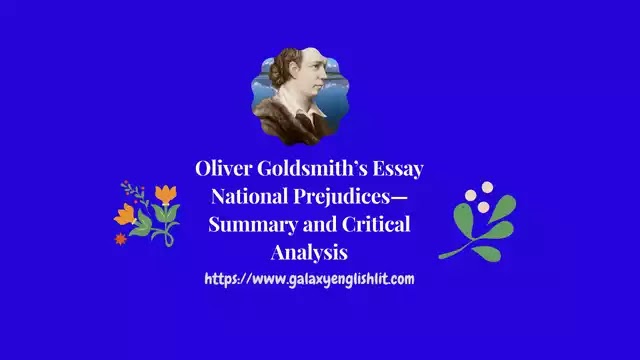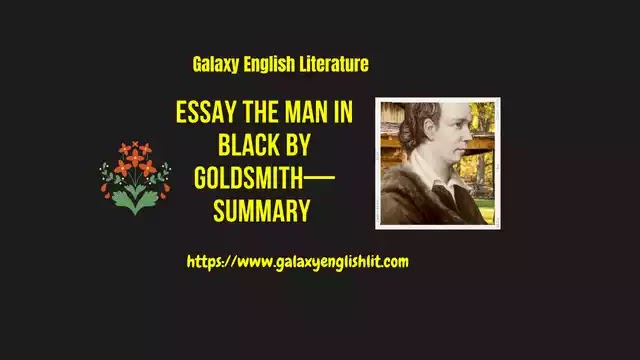A Great Humanitarian:
John Keats, the man, was generally misunderstood in his own life time and even today his personality has been the object of attack. It was his contemporaries who misrepresented him. In this connection Compton Rickett writes: “Popular estimation pictures Keats as a morbid, hysterical youth, As a matter of fact he was a bright, enthusiastic youth, shy and reserved at times, but in the company of friends sane and cheerful in talk, often with a vivacious humour of which there is little trace in his work. Afterwards disease sapped his energies and he became moody, but to the last he was brave and stoical. The best side of Keats’ nature is not displayed in the love letters to Fanny Brawne … His one hobby was for fighting. “He would fight anyone”, said one of his friends, “morning, noon and night”, and was noted for his ‘terrier courage’.
 |
| John Keats As A Man and the Poet |
He is considered a weakling who was prematurely killed by severe criticism. The Black Wood Magazine described him as a young man who died of consumption after having written two or three little books of verses much neglected by the general public. The abused reached the culmination when he was advised to go ‘back to the shop ... back to plasters, pills and ointment boxes’. Shelley and Byron sketched him as a pathetic figure, who was made the target of bitter criticism and this caused his death.
The extreme divergence of opinion about Keats's personality is indicative of the fact that Keats ' portrayal is biased rather than balanced. Hence, in order to present him in the balanced perspective, it is in the fitness of things to have a fair assessment of the poetic stature of Keats so that we may know the man behind his great literary work.
The reality about Keats is that he was neither a weakling nor an escapist. He was a rave man who faced the difficulties of life heroically. His brother, George, has written that ‘John was the very soul of courage and manliness’. In one of his letters Keats writes that he has pride which will enable him ‘to look with an obstinate eye on the Devil himself’. He never took it seriously that he belonged to an ordinary family. He was ‘proud of being the lowest of the human race as Alfred could be in being the highest’. He declared that, “I feel confident I should have been a rebel angel had the opportunity been mine.”
It is evident from the facts of his life that his life was cast in ‘a heroic mould’. Though his own life was full of afflictions, and many members of his family died before his own life, he was fully alive to the world of suffering around him. He was a great humanitarian. He pointed out that he was ‘ambitious of doing the world some good’ and spoke of the dignity of giving his life for a great human cause. In his humanitarian zeal, he declared that ‘fine writing is next to fine doing, the top thing in the world.’ He had such a keen desire to serve humanity as he regarded philosophy as inadequate: “Axioms in philosophy are not axioms till they are proved upon our pulses.”
He was fully aware of the role of the poet and the dreamer. In his Fall of Hyperion he mentions the limitations of the dreamer:
“The poet and the dreamer are distinct
Diverse, sheer opposite, antipoles.
The one pours out a balm upon the world.
The other vexes it. "
Poets are superior to dreamers. They are among those
“Who love their fellows even to death;
Who feel the giant agony of the world;
And more like slaves to poor humanity, Labour for mortal good…..”
According to him the great poet is
"a sage;
A humanist, a physian to all men. "
Keats was as acutely conscious of human sufferings as Wordsworth was. If Wordsworth heard ‘the still sad music of humanity’, Keats felt ‘the giant agony of the world’. He had seen with his own eyes ‘the agony, the strife of human life’. He declared that for public good he was ready to make any sacrifice. When he saw the poor condition of the poor, ignorant and wretched peasants of Scotland, he was deeply moved and he pointed out that “We live in a barbarous age, I would sooner be a wild deer than a girl under the dominion of the Kirk; and I would sooner be a wild hug than be the occasion of a poor creature's penance before those execrable elders.” He held that priests have done greater injustice to mankind then over Tortoars. He bitterly entiased the churchmen of Scotland who had turned their age into ‘a barbarous one’. During the course of his tour in Ireland, he had “too much opportunity to see the worse than nakedness, the rage, the dirt, and the misery of the common Irish.” His comment on the extreme penury and exploitation of the Irish people is replete with humanitarianism ... “Imagine the worst dog kennel you ever saw placed upon two poles from a moudly finding - In such a wretched thing sat a squalid woman squat like an ape half - starved from scarcity.”
In politics, he subscribed to Liberal, but he did spare the Liberals and Napolean from criticism: “Notwithstanding the noise the Liberals make in favour of the cause of Napolean, I cannot but think that he had done more harm to life of Liberty than anyone else could have done. He was pained to see Wordsworth, the great supporter of the French Revolution and pioneer of human cause favouring Toryism. He cried, “Sad! Sad” when he found Wordsworth convassing in favour of a conservative candidate. He ridiculed Shelley for calling this world ‘a vale of tears’. Keats called it the ‘vale of soul – making’, emphasising that sorrow and suffering shaped the character of man.
A Poet of Genius and Promise:
Of the famous poets of the Romantic Revival, Keats was the last to be born and the first to die. He died at a very young age. His was a short life but within this short span of twenty six years, he rose to great heights of creative endeavour. In a very real sense his achievements are unique and unsurpassed. He is ranked with Shakespeare and almost universally regarded as a poet of genius. He is a poet of great promise. Towards the close of his life, Keats wrote: “If I should die, I have left no immortal work behind me ... nothing to make my friends proud of my memory: ... and if I had time, I would have made myself remembered.” This indicates his modesty. In fact, he has left volume of poetry which is of supreme order and which may be put parallel to any great poetry of the world.
It is an irony of fate that such a great and talented poet was not much known outside his literary circle. The Blackwood's and the Quarterly fell heavily in him and his poetry. Even his contemporary Shelley who was most sympathetic to him felt that his work was doomed to total neglect and obscurity. Byron ridiculed him by remarking that he was ‘killed off by one critique’ just at a time when he ' promised something great’. It was in fact Matthew Arnold who for the first time acknowledged his genius. He (Matthew Arnold) went so far as to say that He (Keats) is with Shakespeare. Now when the controversy is over his poetry is properly understood and appreciated by the modern generation, his real worth has been acknowledged universally. He is great in his own right and has legitimately been placed by the side of the great galaxy of Romantic poets like Wordsworth, Coleridge, Shelley and Byron. In respect of high flight of imagination, he may be compared to Mirza Ghalib the great Urdu poet whose genius has also been acknowledged universally.





